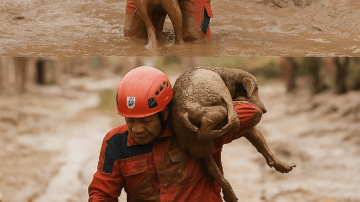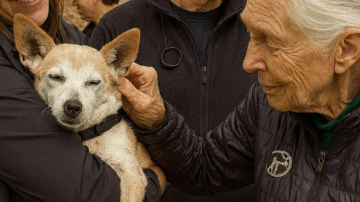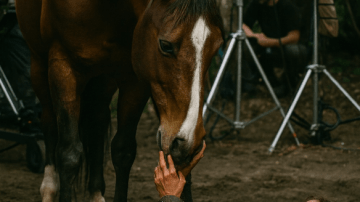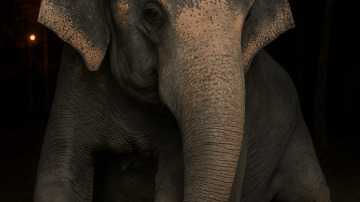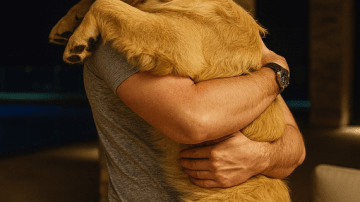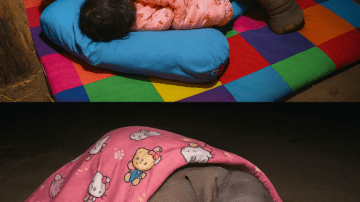This is Akita.

She was found abandoned, left alone in someone’s garden. For two long days she lay there—injured, broken, and fighting for her life with no one to care. By the time we reached her, she was already at the edge of death.
Two of her legs and her tail had rotted from necrosis. Her frail body was crawling with thousands of maggots. She could no longer stand, no longer fight the way a healthy dog should. The smell of decay clung to her fur, warning us just how close she was to losing the battle.
It was late at night when we carried her into the hospital. The room fell into silence. Everyone knew this was not going to be easy. For hours, doctors worked over her fragile frame, cleaning wound after wound, cutting away dead tissue, doing everything they could to keep the infection from spreading further.

At one point, a surgeon quietly suggested it would be kinder to let her sleep forever. To end her suffering. But when we looked into Akita’s eyes, we couldn’t do it. There was something in her gaze—weak though it was—that still wanted to live. And so we chose the desperate path. We chose surgery.
That very night, she underwent emergency amputations. Her front paw, part of her hind leg, and her tail were removed to stop the rot from consuming her completely. It was brutal. It was heartbreaking. But it was the only chance she had.
And against all odds, Akita survived. When she opened her eyes again, she was fragile, trembling, but alive.
Crisis, however, was far from over. The first clinic, afraid of infection, refused to continue her care. We had to scramble, making frantic phone calls, begging for help, moving her from one place to another. There was no time for hesitation—only prayer and action.

For days her blood was checked hour by hour. If her levels dropped, she would need a donor. If her wounds worsened, we would face the decision again: was it fair to keep fighting?
Then, one tiny victory—her parvo test came back negative. A small light in a mountain of fear.
Akita’s body continued its war against necrosis, infection, and broken stitches. At times her fever spiked to 40°C, pushing her to the brink. Each spike brought new antibiotics, new treatments, more sleepless nights. Behind every bandage was exhaustion. Behind every injection was sacrifice. We weren’t just giving money. We were giving pieces of ourselves—our energy, our health, and our unshaken belief that this broken dog was worth fighting for.
And then, one morning, it happened. Akita stood. Shaky, trembling, but determined, she pushed herself onto her legs. She refused to remain a prisoner to her pain. She chose life. That small act was her declaration: “I am not done yet.”
Her blood stabilized, and she was moved from the clinic to a temporary shelter. For the first time in weeks, she had a soft bed, clean food, and a safe space. It was a world away from the garden where she had once been left to die.
The bills stacked higher and higher, but her spirit began to shine brighter with each day.

Her first bath was unforgettable. The stench of rot washed away, replaced by the gentle scent of shampoo. A soft blanket replaced the cold ground. For the first time in her life, Akita smelled not of death, but of dignity. She was dried gently, treated with kindness—a simple act that meant everything to a soul that had known only cruelty.
Soon she began to play. She looked at toys with wide eyes, chased after hands, and barked softly as if rediscovering what joy felt like. Her eyes sparkled, alive again. Who could believe this was the same dog once eaten alive by maggots? The same dog a surgeon thought should be euthanized?
Now Akita lived in safety. She had regular meals, warm baths, and a team that carried her spirit when her body stumbled.
Over the weeks, she learned something extraordinary—how to run on two legs. Watching her bound across thick snow with confidence was like watching a miracle unfold. Her determination defied everything her body had lost. She wasn’t asking for pity. She was demanding belief.
There are plans for a prosthetic leg—complex, expensive, but necessary to save her spine from long-term pain. She waits for it patiently, just as she once waited for rescue in that abandoned garden.
So, who is Akita now?
She is not just a dog. She is living proof that even when the world turns its back, kindness can transform despair into hope. She is a teacher, reminding us all that life, no matter how broken, is worth fighting for.
Look at her now: a two-legged warrior who refuses to be defined by her scars. She asks for no sympathy—only for your trust that she will live fully, joyfully, proudly.

She has endured what few could. She has earned her right to thrive.
Akita’s story is not a tragedy. It is a victory. It is about people who looked beyond wounds and debt, people who chose life again and again. And it is about you—because with every share, every kind word, every donation, you are part of her fight. You are part of her triumph.
Akita reminds us of something powerful: the battle is never just for survival. The battle is for life itself. And life, when given a second chance, can be more radiant than ever imagined.

